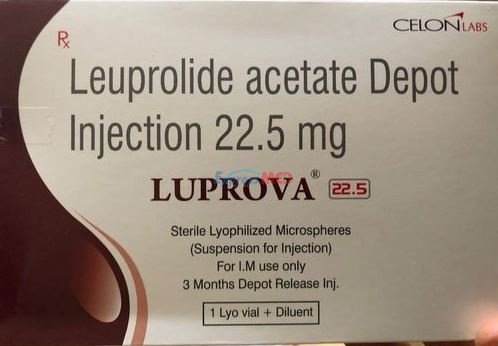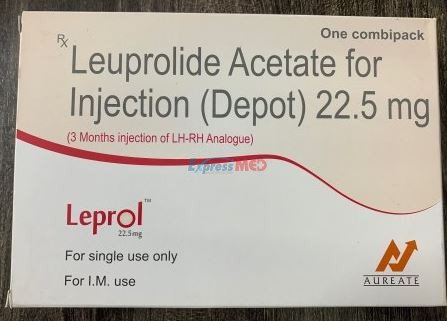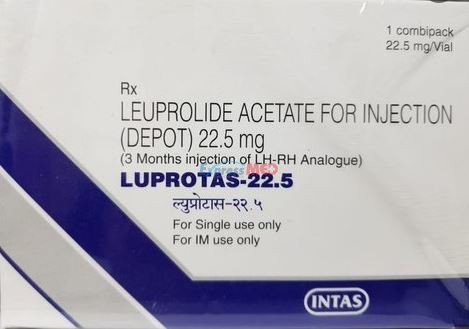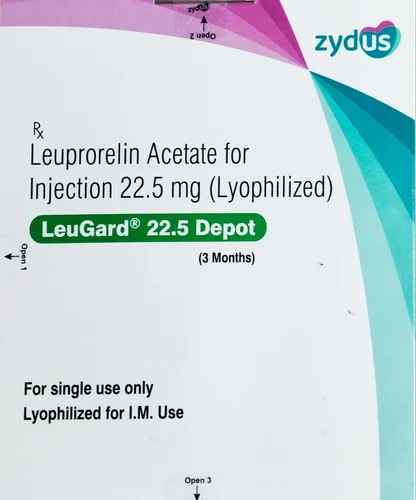Lupron 22.5mg, Abiraterone, and Prednisone: A Comprehensive Guide to Hormonal Therapy for Prostate Cancer
When it comes to prostate cancer treatment, especially advanced or metastatic prostate cancer, hormonal therapy plays a pivotal role in controlling the disease. Among the key medications used in such therapy are Lupron 22.5mg, abiraterone, and prednisone. Each of these medications has a specific purpose, and when used together, they create a powerful combination for managing the disease effectively.
This comprehensive guide will help you understand these medications individually, their roles in prostate cancer therapy, and how they work together. We’ll also address common concerns, side effects, and frequently asked questions regarding Lupron 22.5mg, abiraterone, and prednisone.
What Is Lupron 22.5mg and How Does It Work?
Lupron 22.5mg (leuprolide acetate) is a medication categorized as a gonadotropin-releasing hormone (GnRH) agonist, often used in the treatment of prostate cancer. The 22.5mg dosage refers to a long-acting, three-month depot injection that gradually releases the drug into the body over time.

How Does Lupron Work in Prostate Cancer?
Prostate cancer often depends on androgens (male hormones like testosterone) to grow and spread. Lupron reduces testosterone production by temporarily shutting down the hormonal signals from the brain that stimulate the testes to produce testosterone.
This process, known as androgen deprivation therapy (ADT), starves prostate cancer cells of the hormones they need to grow, effectively slowing or stopping tumor progression.
Benefits of Lupron in Prostate Cancer Therapy
- Reduces testosterone levels quickly and effectively.
- Slows the progression of prostate cancer.
- Administered every three months, reducing the need for frequent injections.
What Is Abiraterone and How Does It Work?
Abiraterone acetate (brand name Zytiga) is another critical medication in the fight against prostate cancer. Unlike Lupron, which suppresses testosterone production from the testes, abiraterone works at a deeper level to inhibit androgen production in the adrenal glands, testes, and prostate tumor itself.
Abiraterone specifically blocks an enzyme called CYP17, which is essential for producing androgens. By targeting this enzyme, abiraterone further reduces androgen levels in the body, offering an additional layer of hormonal control for prostate cancer patients.
When Is Abiraterone Used?
Abiraterone is typically prescribed in combination with prednisone (more on this later) for:
- Metastatic castration-resistant prostate cancer (mCRPC): Advanced prostate cancer that continues to progress despite low testosterone levels.
- Metastatic castration-sensitive prostate cancer (mCSPC): Advanced prostate cancer that still responds to androgen deprivation therapy.

Benefits of Abiraterone in Prostate Cancer Therapy
- Targets androgen production beyond the testes, including the adrenal glands and tumor itself.
- Reduces PSA levels (a marker for prostate cancer progression).
- Improves survival rates for patients with advanced prostate cancer.
What Is Prednisone and Why Is It Used With Abiraterone?
Prednisone is a corticosteroid often prescribed alongside abiraterone to counteract potential side effects of the latter. Since abiraterone inhibits CYP17, it can cause a drop in cortisol levels (a hormone critical for stress and metabolic responses). This drop can lead to an overproduction of another hormone, ACTH (adrenocorticotropic hormone), which may cause side effects such as high blood pressure, low potassium levels, or fluid retention.
The Role of Prednisone
Prednisone replaces the cortisol that abiraterone reduces, helping to:
- Prevent side effects like high blood pressure and low potassium.
- Maintain hormonal balance.
- Enhance the tolerability of abiraterone therapy.
The typical dosage of prednisone when taken with abiraterone is 5mg twice daily, though this may vary depending on the patient’s condition and the prescribing physician’s recommendations.
How Do Lupron, Abiraterone, and Prednisone Work Together?
When used together, Lupron 22.5mg, abiraterone, and prednisone create a comprehensive treatment strategy for advanced prostate cancer. Here’s how they complement one another:
1. Lupron: The Foundation of Androgen Deprivation Therapy (ADT)
Lupron reduces testosterone production from the testes, significantly lowering androgen levels and slowing the growth of hormone-dependent prostate cancer cells.
2. Abiraterone: Enhanced Hormonal Blockade
Abiraterone adds an additional layer of androgen suppression by targeting androgen production in the adrenal glands and the tumor itself. This dual blockade ensures minimal hormone availability for cancer cells.
3. Prednisone: Balancing Hormonal Effects
Prednisone counteracts the side effects of abiraterone by stabilizing cortisol levels and maintaining overall hormonal balance.
Together, this combination maximizes the suppression of androgens, offering a more effective treatment option for advanced prostate cancer compared to ADT alone.

Benefits of Combining Lupron, Abiraterone, and Prednisone
This multi-pronged approach to prostate cancer therapy offers several advantages:
- Enhanced Cancer Control: The combination reduces androgen levels more comprehensively than using Lupron or abiraterone alone.
- Improved Survival Rates: Clinical trials have shown that combining these medications can significantly extend survival in patients with advanced prostate cancer.
- Slower Disease Progression: The dual suppression of androgens can delay the progression of metastatic prostate cancer.
Side Effects of Lupron, Abiraterone, and Prednisone
While this combination therapy is effective, it’s important to be aware of potential side effects. Each medication comes with its own set of risks.
Common Side Effects of Lupron
- Hot flashes.
- Fatigue.
- Loss of libido or erectile dysfunction.
- Bone thinning (osteoporosis).
- Mood swings or depression.
Common Side Effects of Abiraterone
- High blood pressure.
- Low potassium levels (hypokalemia).
- Fluid retention or swelling.
- Liver function abnormalities (elevated liver enzymes).
- Fatigue or weakness.
Common Side Effects of Prednisone
- Increased blood sugar levels (hyperglycemia).
- Weight gain or fluid retention.
- Increased risk of infections.
- Mood changes or insomnia.
- Osteoporosis with prolonged use.
Monitoring and Managing Side Effects
To minimize side effects and ensure the treatment is working effectively, regular monitoring is essential. Your healthcare provider may recommend the following:
- Blood Tests: To monitor liver function, potassium levels, and PSA levels.
- Bone Density Scans: To check for osteoporosis, especially with long-term use of Lupron and prednisone.
- Blood Pressure Monitoring: To detect and manage high blood pressure caused by abiraterone.
Additionally, lifestyle changes such as a healthy diet, regular exercise, and stress management can help reduce the impact of side effects.

Conclusion
The combination of Lupron 22.5mg, abiraterone, and prednisone represents a powerful and effective treatment strategy for advanced prostate cancer. By comprehensively targeting androgen production, this therapy helps slow cancer progression, improve survival rates, and enhance the quality of life for many patients.
While side effects are possible, close monitoring, adherence to your doctor’s recommendations, and lifestyle adjustments can help manage them effectively. Always consult your healthcare provider if you have concerns about your treatment or experience any unusual symptoms.
By staying informed and proactive, you can maximize the benefits of this combination therapy and take an active role in managing your health.
1. How long do I need to take Lupron, abiraterone, and prednisone?
The duration of treatment depends on the stage of prostate cancer and your response to therapy. Some patients may continue this combination for months or even years, while others may transition to different treatments as their condition evolves. Always follow your doctor’s guidance.
2. Can I stop taking prednisone if I feel fine on abiraterone?
No, it’s important to take prednisone as prescribed alongside abiraterone to prevent potential side effects, such as high blood pressure or low potassium. Stopping prednisone without consulting your doctor could result in complications.
3. Are there alternatives to this combination therapy?
Yes, there are other options for treating advanced prostate cancer, including chemotherapy (e.g., docetaxel), newer hormonal therapies (e.g., enzalutamide or apalutamide), and targeted therapies. Your doctor will recommend the best approach based on your specific condition.
